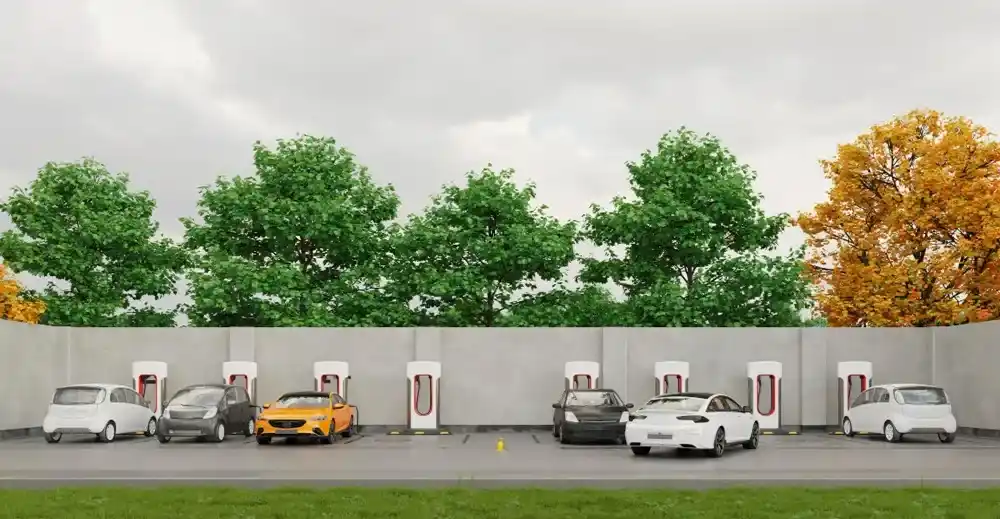How Rising E-Commerce is Boosting Demand for Refrigerated Transport Services

The growth in e-commerce sites, especially food and grocery sectors, has resulted in a considerable increase in demand for refrigerated transportation services, especially as the mode of shopping changes to one that encourages purchases of perishable foods for direct home delivery. Most consumers expect fresh and frozen foods, high-convenience food and beverage products, to be delivered swiftly and availably to their homes, proving yet another compelling attribute for companies to invest heavily in making their cold-chain refrigerator systems more efficient.
The demand for refrigerated transportation is predicted to be propelled by the expansion of e-commerce platforms, especially those like Instacart and Amazon Fresh. World e-commerce has increased the importance of refrigerated transportation for international delivery and timely delivery of perishable goods like food and beverage, and pharmaceutical products across borders. For example, India produces low-cost vaccinations for the global market. The world's 60% vaccination coverage is accounted for by India, and 70 percent of the total DPT and BCG vaccines, and 90 percent of measles vaccines are all available in the country. For this continuous rise, maintenance of ambient conditions for these products is becoming a developing and evolving innovation of the industry in refrigerated transport.
Besides, in the report from APEDA Agri Exchange Source for fruit juices on data related to the expansion of juice segment volume, the worldwide total volume, which was 36,223.6 million liters in 2022, is expected to increase to 36,809 million liters by 2023. Most of this is taken by orange juice, followed by other juices which is expected to contribute to the rising demand for refrigerated transport services, since these will require effective refrigerated transport for quality maintenance and extension of shelf life.
There exists a global demand for temperature-sensitive goods, primarily fresh food and medicines, driven by the growth of e-commerce. Companies in the refrigerated sector, in turn, enable the capability of e-commerce players to be able to meet the demand for freshness and quality by their consumers. Innovative refrigerated containers and reefer trucks are doing wonders for changing the way temperature-sensitive goods are delivered and transforming holistic e-commerce landscapes while being indispensable components for industry growth.
According to the Dubai World Trade Center January 2023, the pharmaceutical market of UAE is expected to reach US$4.7 billion by 2025 and these consist of around 23 manufacturing centers and nearly 2,500 medicines produced locally by 2023. Furthermore, the pharmaceutical export value of the nation is estimated to capture approximately US$297 million by 2025 and project a growth of 21% from 2021. Furthermore, within the online pharmaceuticals industry, increasing demand for reliable refrigerated transport is shaping up for both efficient delivery and a cold supply chain for temperature-sensitive medicines such as vaccines, antibiotics, and insulin.
With online remodeling getting higher, with the meat and dairy industry rising and leading to an increase in cross-country demand, the market in fresh and frozen food delivery continues to show upward growth. Refrigerated companies now offer refrigeration container boxes capable of keeping perishable items fresh and maintaining good quality. They provide suitable environments for delivery, and the temperatures help prevent item spoilage for their clients, thus delivering fresh and quality guaranteed supply to consumers. Thus, there is an increase in the trend of buying fresh items online, which is making the demand for refrigerated transport services increase. Retail channels that deal in perishables items, such as those offered via online shopping platforms, are already showing positive growth. For instance, statistics from the United States Census Bureau showed that retail e-commerce sales in the country amounted to US$ 300.1 billion in the third quarter of 2024.
Figure 1: Increase in Volume of Juice Segment in the World, in Million Liters, in 2022 and 2023
 Source: APEDA Agri Exchange
One of its components is online and thermal features, like GPS-tracking and temperature-controlling systems, through which they can maximize and monitor their cold chain logistics activities. Thus, this would stimulate an increased demand for such a kind of system. This demand would yield a better return owing to the growth of the e-commerce sector. In this context, in November 2024, Carrier Transicold displayed future-ready digital and refrigeration transport systems to assist cold chain solutions at Intermodal Europe in Rotterdam, The Netherlands.
Additionally, cold chain transportation is rapidly increasing throughout the continents as it had to do with the development of e-commerce in Europe due to the high expectation of many consumers on freshness and quality of food. It is also very much because of an increase in the requisite speed and reliability in delivering certain ranges of temperatures. Thus, effective refrigerated transport would ensure the integrity of perishable goods. For instance, in June 2024, MHI Thermal Systems introduced a new electric-driven transport refrigeration unit, TEK Products, specifically designed for use in small and mid-size trucks. These will feature pressure for European delivery and the plug-in-hybrid will take care of the inside temperature while not moving in the future during parking and idling. It meant improving cooling/heating capacity expanded to include small and mid-size trucks beyond the TE20/30 series' mountable range.
Similarly, in June 2024, Sunswap, the manufacturer of Endurance, associated with MAN Truck & Bus to test its Latest TGX 4x2 eTruck, in the UK. The press event was for customers at HORIBA Mira Test Track to showcase this collaboration as another milestone in implementing a sustainable cold chain with an electric truck and a fully electric refrigeration unit.
Key Developments:
Source: APEDA Agri Exchange
One of its components is online and thermal features, like GPS-tracking and temperature-controlling systems, through which they can maximize and monitor their cold chain logistics activities. Thus, this would stimulate an increased demand for such a kind of system. This demand would yield a better return owing to the growth of the e-commerce sector. In this context, in November 2024, Carrier Transicold displayed future-ready digital and refrigeration transport systems to assist cold chain solutions at Intermodal Europe in Rotterdam, The Netherlands.
Additionally, cold chain transportation is rapidly increasing throughout the continents as it had to do with the development of e-commerce in Europe due to the high expectation of many consumers on freshness and quality of food. It is also very much because of an increase in the requisite speed and reliability in delivering certain ranges of temperatures. Thus, effective refrigerated transport would ensure the integrity of perishable goods. For instance, in June 2024, MHI Thermal Systems introduced a new electric-driven transport refrigeration unit, TEK Products, specifically designed for use in small and mid-size trucks. These will feature pressure for European delivery and the plug-in-hybrid will take care of the inside temperature while not moving in the future during parking and idling. It meant improving cooling/heating capacity expanded to include small and mid-size trucks beyond the TE20/30 series' mountable range.
Similarly, in June 2024, Sunswap, the manufacturer of Endurance, associated with MAN Truck & Bus to test its Latest TGX 4x2 eTruck, in the UK. The press event was for customers at HORIBA Mira Test Track to showcase this collaboration as another milestone in implementing a sustainable cold chain with an electric truck and a fully electric refrigeration unit.
Key Developments:
Find some of our related studies:
 Source: APEDA Agri Exchange
One of its components is online and thermal features, like GPS-tracking and temperature-controlling systems, through which they can maximize and monitor their cold chain logistics activities. Thus, this would stimulate an increased demand for such a kind of system. This demand would yield a better return owing to the growth of the e-commerce sector. In this context, in November 2024, Carrier Transicold displayed future-ready digital and refrigeration transport systems to assist cold chain solutions at Intermodal Europe in Rotterdam, The Netherlands.
Additionally, cold chain transportation is rapidly increasing throughout the continents as it had to do with the development of e-commerce in Europe due to the high expectation of many consumers on freshness and quality of food. It is also very much because of an increase in the requisite speed and reliability in delivering certain ranges of temperatures. Thus, effective refrigerated transport would ensure the integrity of perishable goods. For instance, in June 2024, MHI Thermal Systems introduced a new electric-driven transport refrigeration unit, TEK Products, specifically designed for use in small and mid-size trucks. These will feature pressure for European delivery and the plug-in-hybrid will take care of the inside temperature while not moving in the future during parking and idling. It meant improving cooling/heating capacity expanded to include small and mid-size trucks beyond the TE20/30 series' mountable range.
Similarly, in June 2024, Sunswap, the manufacturer of Endurance, associated with MAN Truck & Bus to test its Latest TGX 4x2 eTruck, in the UK. The press event was for customers at HORIBA Mira Test Track to showcase this collaboration as another milestone in implementing a sustainable cold chain with an electric truck and a fully electric refrigeration unit.
Key Developments:
Source: APEDA Agri Exchange
One of its components is online and thermal features, like GPS-tracking and temperature-controlling systems, through which they can maximize and monitor their cold chain logistics activities. Thus, this would stimulate an increased demand for such a kind of system. This demand would yield a better return owing to the growth of the e-commerce sector. In this context, in November 2024, Carrier Transicold displayed future-ready digital and refrigeration transport systems to assist cold chain solutions at Intermodal Europe in Rotterdam, The Netherlands.
Additionally, cold chain transportation is rapidly increasing throughout the continents as it had to do with the development of e-commerce in Europe due to the high expectation of many consumers on freshness and quality of food. It is also very much because of an increase in the requisite speed and reliability in delivering certain ranges of temperatures. Thus, effective refrigerated transport would ensure the integrity of perishable goods. For instance, in June 2024, MHI Thermal Systems introduced a new electric-driven transport refrigeration unit, TEK Products, specifically designed for use in small and mid-size trucks. These will feature pressure for European delivery and the plug-in-hybrid will take care of the inside temperature while not moving in the future during parking and idling. It meant improving cooling/heating capacity expanded to include small and mid-size trucks beyond the TE20/30 series' mountable range.
Similarly, in June 2024, Sunswap, the manufacturer of Endurance, associated with MAN Truck & Bus to test its Latest TGX 4x2 eTruck, in the UK. The press event was for customers at HORIBA Mira Test Track to showcase this collaboration as another milestone in implementing a sustainable cold chain with an electric truck and a fully electric refrigeration unit.
Key Developments:
| Year | Development |
| September 2024 | Carrier Transicold introduced a Vector HE 19 refrigeration unit at Hanover, Germany, the IAA Transportation occurred in September 2024. The newly emerging unit is specially designed using low-GWP refrigerants with hydrogenated vegetable oil biofuel or B100 biofuel. This latest refrigeration solution semi-trailers were developed especially to maximize performance while reducing carbon dioxide emissions. |
| February 2024 | Sumitomo Corporation and Orient Overseas Container Line Limited released a mutual business cooperation agreement on ocean transport by cold container technology with the application of an electric field. This newly developed refrigerated technology aims at linking new sources of production and consumption in chilled foods markets so as to extend the time for freshness in some commercial products. The partnership expects to present low-carbon ways of connecting such new production and consumption areas of chilled food. |
| November 2023 | Daikin's showcase at the SOLUTRANS event held in Lyon, France, introduced its fully electric and plug-in hybrid chilled transport product range. Its refrigeration solutions include those for vans, trailers, and trucks. Daikin also launched its latest refrigeration unit, Exigo, as well as its Daikin Telematics connectivity platform, providing movement comfort. |
Get in Touch
Interested in this topic? Contact our analysts for more details.
Latest Thought Articles

Top OSAT Companies Driving Semiconductor Assembly and Test Services Worldwide
Recently
EV Charging Stations Market Outlook: Smart Charging, Fast Charging, and Regional Expansion
Recently
Future of Corporate Wellness: Global Trends and Regional Outlook
Recently
Regional Breakdown of the Mechanical Keyboard Market: Who Leads and Why?
Recently